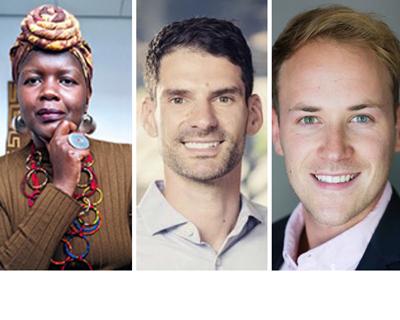Democratic Futures and the LGBT+ community: Looking back and looking ahead

On 9 February 2021, Dr Awino Okech (SOAS) and Dr Phillip Ayoub (Occidental College, LA, USA) discussed the ways in which LGBT+ communities are shaping democratic futures. The panel was moderated by Dr Valentina Cardo, Co-Director of the Centre for Democratic Futures and addressed the following questions: What do the current crises of democracy mean for LGBTQ+ communities? What are the opportunities and obstacles for forming coalitions for LGBTQ+ communities to address these crises? Thinking about the futures of democracy, what are LGBTQ communities doing “right”? What are they doing “wrong”?
Phillip Ayoub a specialist in international relations and comparative politics, transnational politics, gender and politics, norm diffusion and the study of social movements, reminded the audience that LGBTQ+ communities have a lot of experience in navigating crises. He emphasised that all of the current crises – financial, refugee and health crises – concern the LGBTQ+ community – or rather communities. Each of these crises concerns rights and equality and is tied to democratic backsliding, populism, and power hierarchies, which are for example reflected in anti-gay propaganda and legislation.
Awino Okech, whose research specialisms include gender, sexuality, security and nation/state making projects as they occur in conflict and post-conflict societies highlighted the intersection of race, class, gender and sexuality. She illustrated how LGBTQ+ activism is interwoven with other political struggles drawing on examples from Nigeria and Myanmar. Dr Okech emphasized that the acknowledgement of the intersection of structural inequalities from capitalism to racial and gender inequality can be a basis for coalitions.
Drawing on his research on Intersectional and Transnational Coalitions during Times of Crisis: The European LGBTI Movement, Phillip Ayoub noted that a crisis can be an opportunity, because shared threats connect, and growing nationalism can make LGBTQ groups aware of the most marginal members of the community. However, this comparative research also revealed different patterns in different national contexts. Whereas a galvanisation of the movement could be observed in Poland in response to threat, this was not the case in the Czech Republic where the movement faced less opposition initially.
Awino Okech then discussed three important aspects of mobilisation in times of crisis. Referring to the role of mutual-aid and self-organisation when states fail. She also highlighted that autonomous spaces are not mutually exclusive with cross-movement and transnational organising, but essential for rejuvenation and movement survival for cross-movement work which is emotional demanding. Thirdly, she highlighted learning – what can movements learn from queer organising? LGBTQ activists have historically always been part of other social movements and have always been organising against structural exclusion.
Phillip Ayoub shared the concern that LGBTQ communities are not free of power hierarchies. Nevertheless, he noted that international LGBTQ movements have successfully contributed to changing attitudes and introduced new rights legislation with relatively quick transformations over time. As examples he pointed to the adoption of gay marriage in Ireland in 2015 or the high ranking of Malta on the Rainbow Map, whereas European countries which were once leading with respect to LGBTQ rights have fallen behind. He also noted that transnational LGBTQ communities are not a new phenomenon but exist since the mid-19th century. However, human rights organization ILGA-Europe is using the European Union institutional framework to push for rights. While transnational channels and opportunity structures like the European Union and the United Nations play an important role, it is also important that LGBTQ activism is locally rooted and that its actions and frames resonate in the national and local context to mitigate risks of backlash. Thus, transnational factors and local currents are both important for successful mobilisation. Ayoub also warned of the co-optation of the LGBTQ+ community by populist and right-wing leaders, giving the example of ‘Trump Pride’, vilifying refugees or countries as homophobic, and gay and lesbian members of German or Dutch right-wing parties
Awino Okech problematised the gap between queer theory and queer political practice noting that queer theory that is not attentive to the material conditions of queer movements can become irrelevant. She also pointed to the role of strategic litigation as a mechanism to develop new landscapes of freedom as important citing the work of the Coalition of African Lesbians in challenging institutions designed to protect “rights”
The insightful dialogue between Phillip Ayoub and Awino Okech was followed by a lively discussion which included the role of music and arts in activism. The event was well attended, including international participants. Unfortunately, Dr Stuart J. Turnbull-Dugarte (Soton), who specialises in political party competition, electoral behaviour and political psychology had to cancel his participation on short notice due to an emergency.